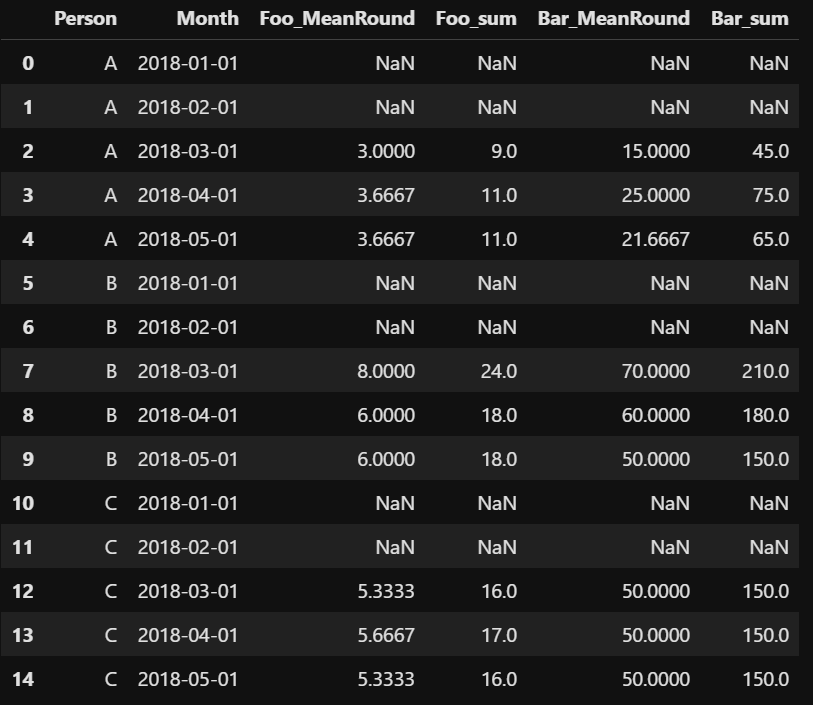-
-
Notifications
You must be signed in to change notification settings - Fork 17.4k
New issue
Have a question about this project? Sign up for a free GitHub account to open an issue and contact its maintainers and the community.
By clicking “Sign up for GitHub”, you agree to our terms of service and privacy statement. We’ll occasionally send you account related emails.
Already on GitHub? Sign in to your account
GroupbyRolling aggregate error introduced by bottleneck #26156
Comments
|
MeanRound is not defined |
|
edited just now |
|
this is user error; you are performing a mean on a series, yielding a scalar (a float), so you need to use |
|
@jreback, can you help me understand why My user experience was that I added the I totally understand the "user error" aspect, but perhaps my code should have thrown the same error even if bottleneck is not installed, instead of giving me what I want? |
|
you would have to debug inside the function |
|
you're right -- I could have isolated the issue more efficiently. My thought was that the traceback would have something related to numpy or bottleneck...? AttributeError Traceback (most recent call last)
~\AppData\Local\Continuum\miniconda3\envs\azure_automl\lib\site-packages\pandas\core\groupby\groupby.py in apply(self, func, *args, **kwargs)
688 try:
--> 689 result = self._python_apply_general(f)
690 except Exception:
~\AppData\Local\Continuum\miniconda3\envs\azure_automl\lib\site-packages\pandas\core\groupby\groupby.py in _python_apply_general(self, f)
706 keys, values, mutated = self.grouper.apply(f, self._selected_obj,
--> 707 self.axis)
708
~\AppData\Local\Continuum\miniconda3\envs\azure_automl\lib\site-packages\pandas\core\groupby\ops.py in apply(self, f, data, axis)
189 group_axes = _get_axes(group)
--> 190 res = f(group)
191 if not _is_indexed_like(res, group_axes):
~\AppData\Local\Continuum\miniconda3\envs\azure_automl\lib\site-packages\pandas\core\window.py in f(x, name, *args)
797
--> 798 return x.apply(name, *args, **kwargs)
799
~\AppData\Local\Continuum\miniconda3\envs\azure_automl\lib\site-packages\pandas\core\window.py in apply(self, func, raw, args, kwargs)
1702 return super(Rolling, self).apply(
-> 1703 func, raw=raw, args=args, kwargs=kwargs)
1704
~\AppData\Local\Continuum\miniconda3\envs\azure_automl\lib\site-packages\pandas\core\window.py in apply(self, func, raw, args, kwargs)
1011 return self._apply(f, func, args=args, kwargs=kwargs,
-> 1012 center=False, raw=raw)
1013
~\AppData\Local\Continuum\miniconda3\envs\azure_automl\lib\site-packages\pandas\core\window.py in _apply(self, func, name, window, center, check_minp, **kwargs)
879 else:
--> 880 result = calc(values)
881
~\AppData\Local\Continuum\miniconda3\envs\azure_automl\lib\site-packages\pandas\core\window.py in calc(x)
873 return func(x, window, min_periods=self.min_periods,
--> 874 closed=self.closed)
875
~\AppData\Local\Continuum\miniconda3\envs\azure_automl\lib\site-packages\pandas\core\window.py in f(arg, window, min_periods, closed)
1008 arg, window, minp, indexi,
-> 1009 closed, offset, func, raw, args, kwargs)
1010
c:\Users\anders.swanson\Documents\attrition\pandas\_libs\window.pyx in pandas._libs.window.roll_generic()
<ipython-input-13-bffd2448d694> in MeanRound(x)
2 # return np.round(x.mean(),4)
----> 3 return x.mean().round(4) |
|
as i said your code is incorrect; it happens to work because a np.float64 has a round method; if there is a float returned it will fail |
|
thanks for staying with me here.
am i correct in that my general takeaway should be to:
|
|
you shouldn’t use custom functions as all |
|
the real source of this "user error" is that |
|
Sidebar the real reason I'm using a custom function is because of this deprecated functionality (see #18366). The workaround is to use custom function simply so that I can flatten resulting hierarchical column index into meaningful column names (see below). If I use lambda functions, I've lost the ability to programmatically name the columns. df_rolls = (df
.sort_values(by=['Month', 'Person'], ascending=True)
.set_index(['Month'])
.groupby(['Person'])
.rolling(3, min_periods=3)
)
def MeanRound(x):
return np.round(x.mean(), 4)
df = df_rolls.agg([MeanRound, 'sum'])
df.columns = ["_".join(x) for x in df.columns.ravel()]
df.reset_index(drop= False, inplace = True)
df |

Code Sample, a copy-pastable example if possible
this works without bottleneck installed but throws this error:
# AttributeError: 'float' object has no attribute 'round'Problem description
my intention is to compute rolling a rolling mean and sum on multiple columns at once (see below). I was using agg because it allows for multiple functions at once.
Expected Output
I was able get a workaround with apply (even though
.transform()isn't implemented forRollingGroupby?)Output of
pd.show_versions()[paste the output of
pd.show_versions()here below this line]before bottleneck
after bottleneck
The text was updated successfully, but these errors were encountered: